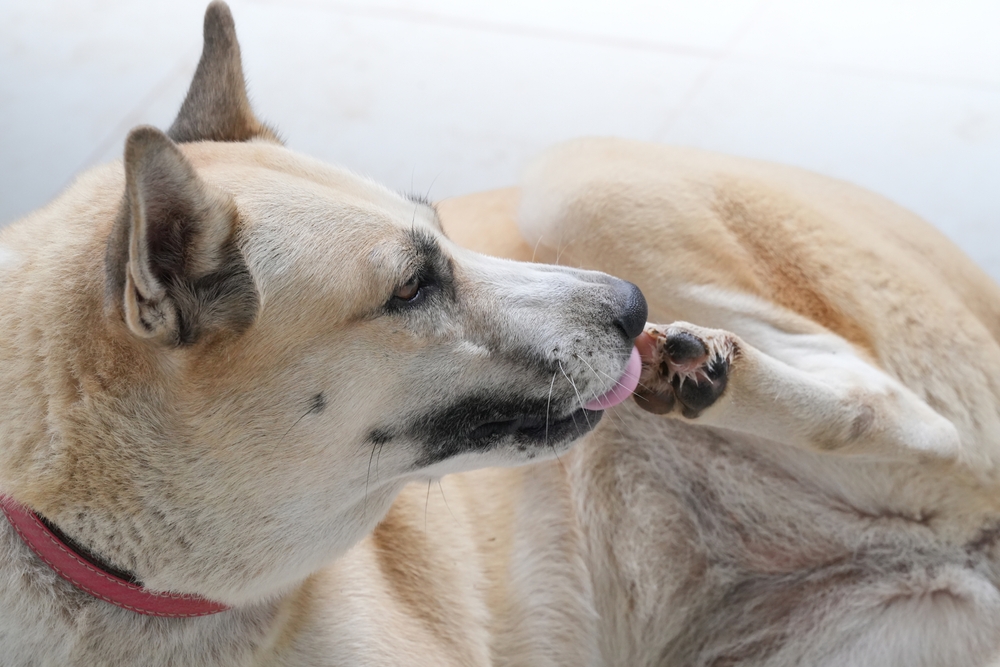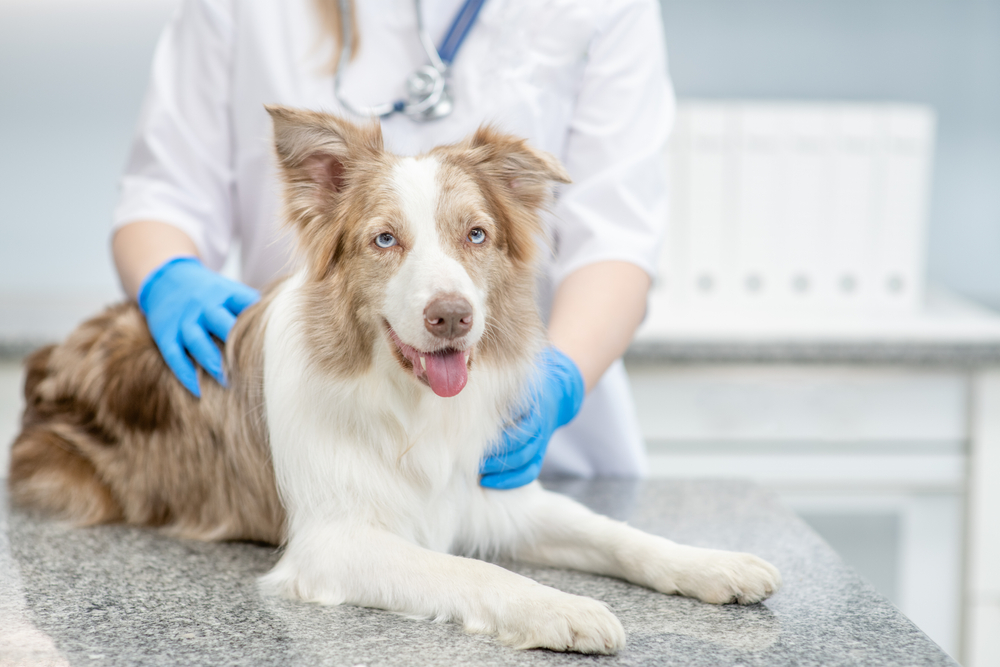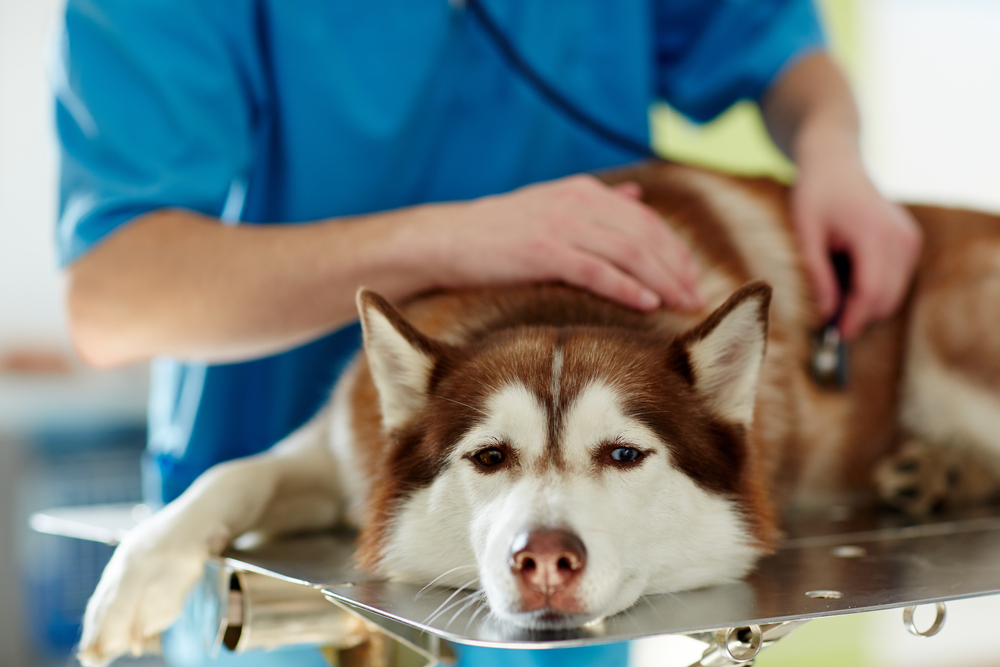Dogs never cease to fascinate us with their unusual behaviors and quirky mannerisms. From a classic case of the zoomies to concentrated tail-chasing sessions, the causes of our dog’s behaviors aren’t always easily identifiable. Paw licking is one of those behaviors that can either be completely normal or indicative of an issue.
While some degree of paw licking occasionally can be part of your pup’s self-grooming routine, excessive or aggressive licking can be a sign of an underlying health concern. Read on to learn more about this behavior, including what causes it and tips on how to stop it.
The 11 Tips to Stop Your Dog From Licking Their Paws
1. Addressing Underlying Issues
When it comes to the health of your dog, you never want to use band-aid solutions. Unfortunately, there are many potential reasons your pup is licking themselves, which can make identifying the underlying issue a bit challenging and even expensive if you need to take them to the vet to find out what’s going on. However, if your dog is licking their paws more often than as part of their self-grooming regimen, it’s time to get your veterinary team involved.
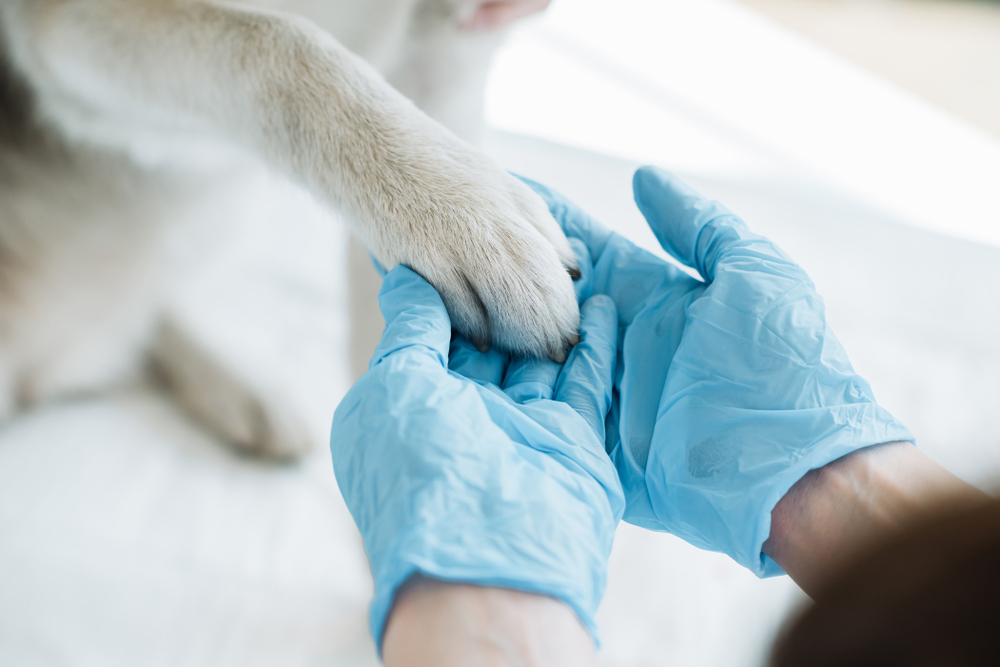
2. Make Dietary Changes
If your vet thinks a food allergy may be leading to excessive paw licking, they’ll probably recommend you put your dog on a food trial. This is a long and sometimes grueling process that can take months, but it will help determine which food(s) triggers your pup’s allergies so you can eliminate them from their diet.
3. Tend to Your Pup’s Paws
After spending time outside, wash and dry off your pup’s paws to protect them from any environmental allergens or irritants they may have encountered on their adventures.
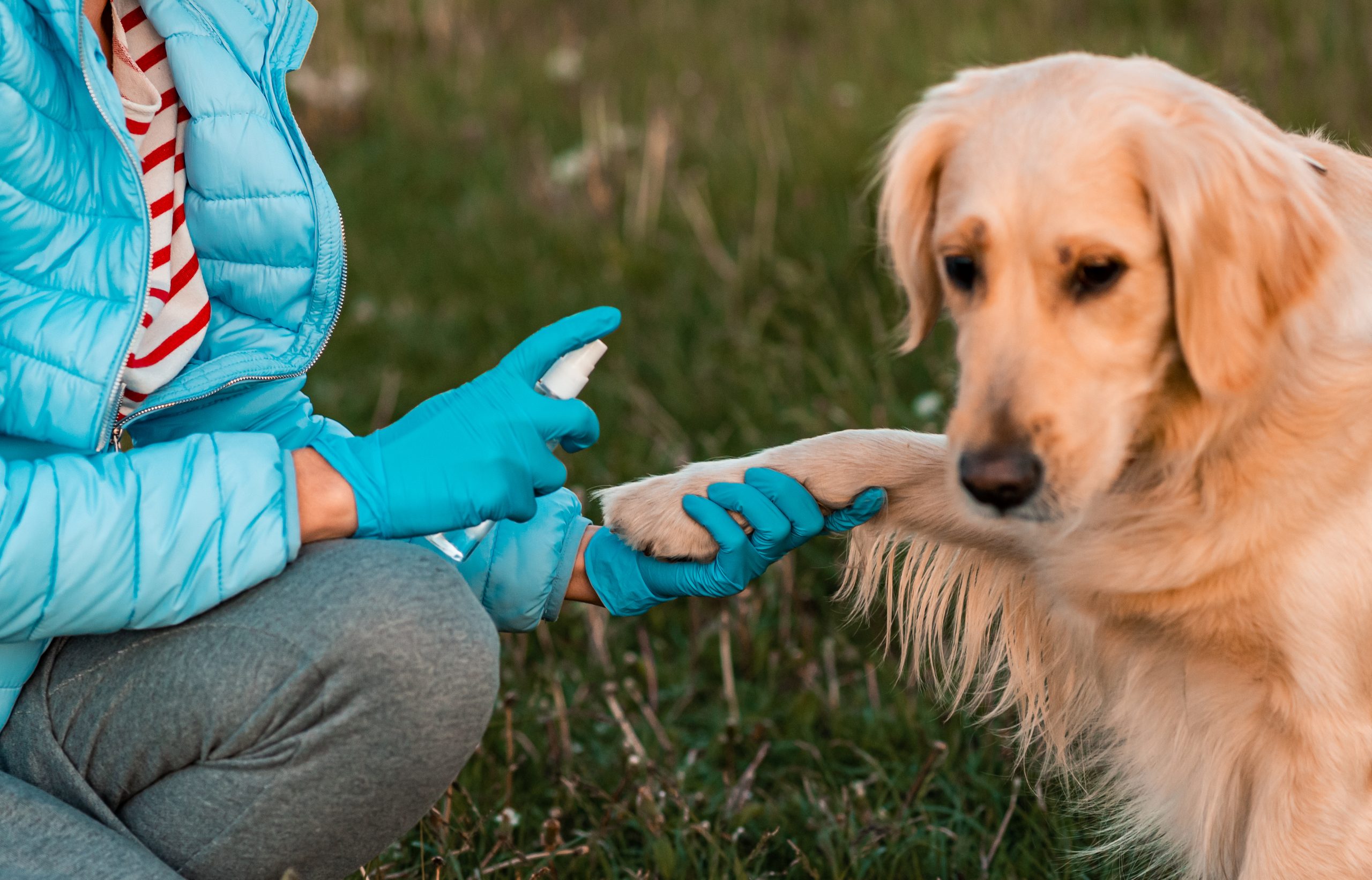
4. Hold Off on Spending Time Outside in Severe Weather
Things like hot sidewalks in the summer or salt-sprinkled walkways in winter can cause severe irritation and even burn your dog’s paws. When your pup’s paws are aching, they’ll be more likely to try to bite or lick them to relieve the pain.
Hot sidewalks in the summer can cause discomfort, blisters, and burns to your dog’s paw pads. A good rule of thumb to determine whether the pavement is too hot for your pup is to place the back of your hand on it for ten seconds. If it feels too hot on your hand, that’s a good sign to put off your walk until the sun has set.
Most commercial ice melts used in winter to deal with the ice on your sidewalks are dangerous not only for the burns and injuries they can cause to your pup’s paws but also because they sometimes contain chemicals that can be toxic for pets.
5. Use an Oatmeal Shampoo
If your pup’s paws are itchy, chances are they’re licking them to try to relieve themselves of that annoying itch. Oatmeal has natural anti-inflammatory properties that can soothe your pup’s itchy skin, so using dog-friendly oatmeal shampoo on their paws could help relieve the discomfort. These shampoos are generally used to help soothe dogs’ dry and itchy skin, so it could be beneficial.
Giving your dog’s paws an oatmeal bath could also help.
If you are looking for the perfect, pet-friendly shampoo and conditioner combo, we highly recommend the products by Hepper. With a soothing oatmeal shampoo, free of soaps and other harsh chemicals, and a cucumber and aloe scented conditioner, your pet's skin and coat will be smooth, hydrated, and irritation-free.
At Dogster, we’ve admired Hepper for many years, and decided to take a controlling ownership interest so that we could benefit from the outstanding products of this cool pet company!
6. Try Dog Booties
You can use protective footwear like booties when you go outside for walks if you notice your dog’s paw licking worsens after coming inside from your adventures. Dog booties shouldn’t be left on for more than an hour or two though as they aren’t breathable.
In the house you can try a pair of children’s cotton socks over their paws to try and make them inaccessible and break the cycle of compulsive licking. Just make sure your dog isn’t likely to eat or chew socks if you use this option, otherwise an Elizabethan collar would be a safer solution.
7. Use Paw Balms
Your dog may be licking themselves because their paws are dry or cracked. If this is the case, a paw balm might be a good option, as it can add some much-needed moisture and provide relief.

8. Try an Elizabethan Collar
Elizabethan collars, less colloquially known as “the cone of shame,” can be a temporary solution to your dog’s paw-licking problems. These collars are designed to fit around your dog’s neck and are used to prevent them from getting at surgical sites or wounds. Since the cone makes accessing the paws impossible, your pup will have no choice but to stop licking.
9. Give Your Pup a Routine to Look Forward To
Dogs that lick themselves excessively due to boredom may need a more predictable and fun daily routine.
Ensure your pup is getting enough exercise and plenty of mental stimulation to keep them happy and healthy. If your schedule is too busy to provide the amount of physical activity your dog needs, you might consider taking them to doggy daycare or hiring a dog walker to keep them busy while you’re away at work all day.
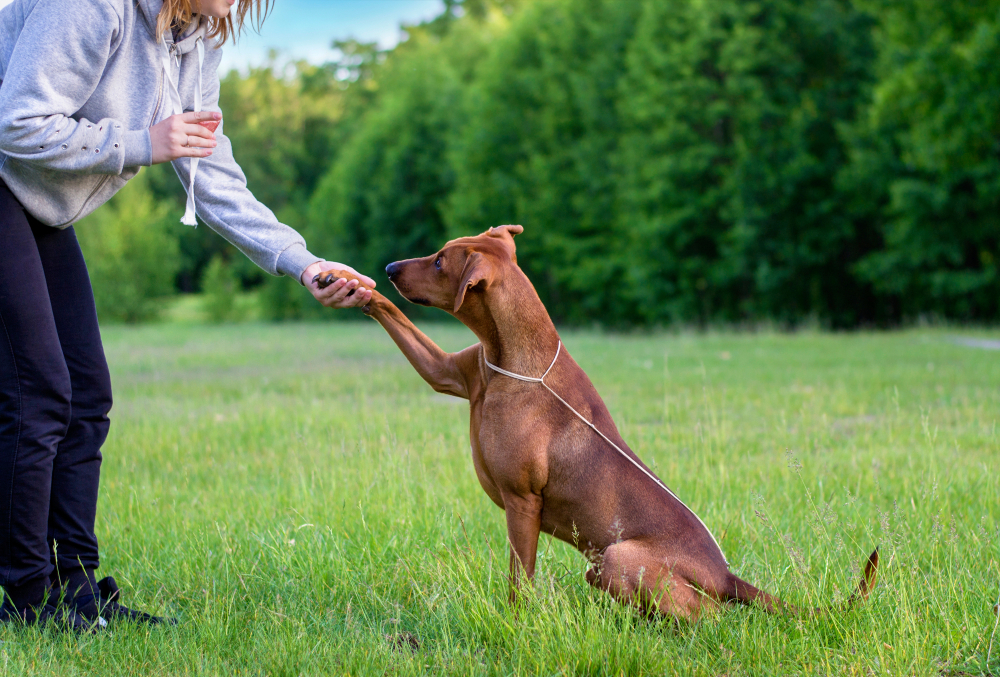
10. Reduce Stressors
Dogs with stress may resort to licking or chewing their paws as a way to deal. Other signs of stress can include:
- Yawning
- Panting
- Pacing
- Licking their lips
- Whining
- Barking
- Shedding
- Dilated pupils
- Pinned back ears
If your pup is exhibiting these signs, look at their living arrangements. Do they have a safe space they can retreat to when stress triggers (e.g., guests, loud noises, etc.) occur? If not, consider creating a sanctuary for your pup in a quiet area of your home.
However, if your dog is chronically stressed, we recommend seeing your veterinarian. They may refer you to a trainer or animal behaviorist to evaluate your pup’s stress-related problems or prescribe anti-anxiety medications if they deem it necessary.
11. Know When to See the Vet
While paw licking isn’t typically considered an emergency, we do recommend seeing your veterinarian as soon as possible if you notice your dog exhibiting any of the following concerning signs:
- Bleeding from the paws
- Swollen paws
- Limping
- Pus or discharge
- Whimpering or crying when touched or trying to walk
Your dog may be injured if they’re focusing on biting or licking a single paw, which would necessitate a veterinary visit as soon as possible. It could be something as simple as a thorn stuck in the paw pad or irritation from a walk on hot gravel, but it’s always best to err on the side of caution.
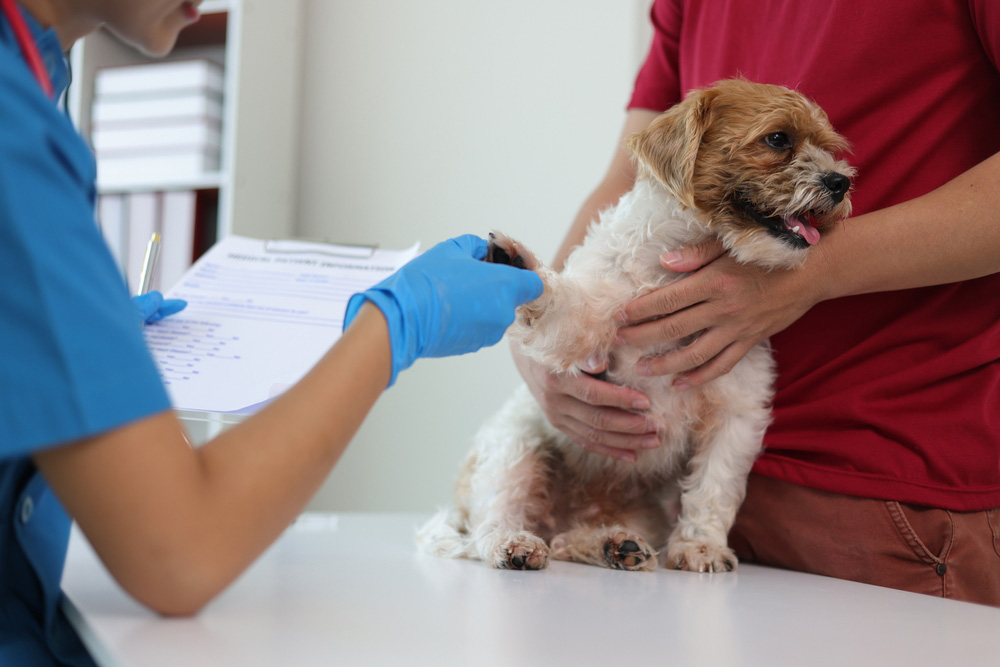
Is Paw Licking Really That Bad?
Frequent licking can build up moisture in your dog’s paws, which can eventually lead to bacterial or yeast infections. Such infections can exacerbate your dog’s licking problem, further contaminating the area with bacteria and impairing the healing process indefinitely.
We recommend seeing your veterinarian as soon as you notice your dog’s excessive licking. They can prescribe topical sprays to ease itchiness, steroids to reduce inflammation, antifungals for yeast infections, and antibiotics if bacterial infections are to blame. The sooner you determine the cause of your pup’s problematic paw licking, the faster you can begin treatment and provide much-needed relief.
Why Does My Dog Lick Their Paws?
The key to preventing your pup from licking their paws is to determine why they’re licking them in the first place.
There are several reasons why your dog might lick their paws. These include:
- Self-grooming
- Injuries
- Skin problems
- Parasites
- Arthritis
- Cysts or tumors
- Allergies (environmental or food)
- Boredom
- Obsessive-compulsive disorder
- Anxiety
- Pain
Final Thoughts
Some dogs lick themselves as part of their self-grooming regimen, but if your pup’s paw licking has become excessive or if other unusual signs accompany the behavior, further investigation may be necessary. Excessive licking can cause a host of issues for your pup, including problematic secondary infections, so the sooner you determine why they’re exhibiting this behavior, the better.
As always, we recommend keeping an open line of communication with your veterinary team so they are always informed about your pup’s behavior and health.
Featured Image Credit: KPhrom, Shutterstock
Contents
- The 11 Tips to Stop Your Dog From Licking Their Paws
- 1. Addressing Underlying Issues
- 2. Make Dietary Changes
- 3. Tend to Your Pup’s Paws
- 4. Hold Off on Spending Time Outside in Severe Weather
- 5. Use an Oatmeal Shampoo
- 6. Try Dog Booties
- 7. Use Paw Balms
- 8. Try an Elizabethan Collar
- 9. Give Your Pup a Routine to Look Forward To
- 10. Reduce Stressors
- 11. Know When to See the Vet
- Is Paw Licking Really That Bad?
- Why Does My Dog Lick Their Paws?
- Final Thoughts

